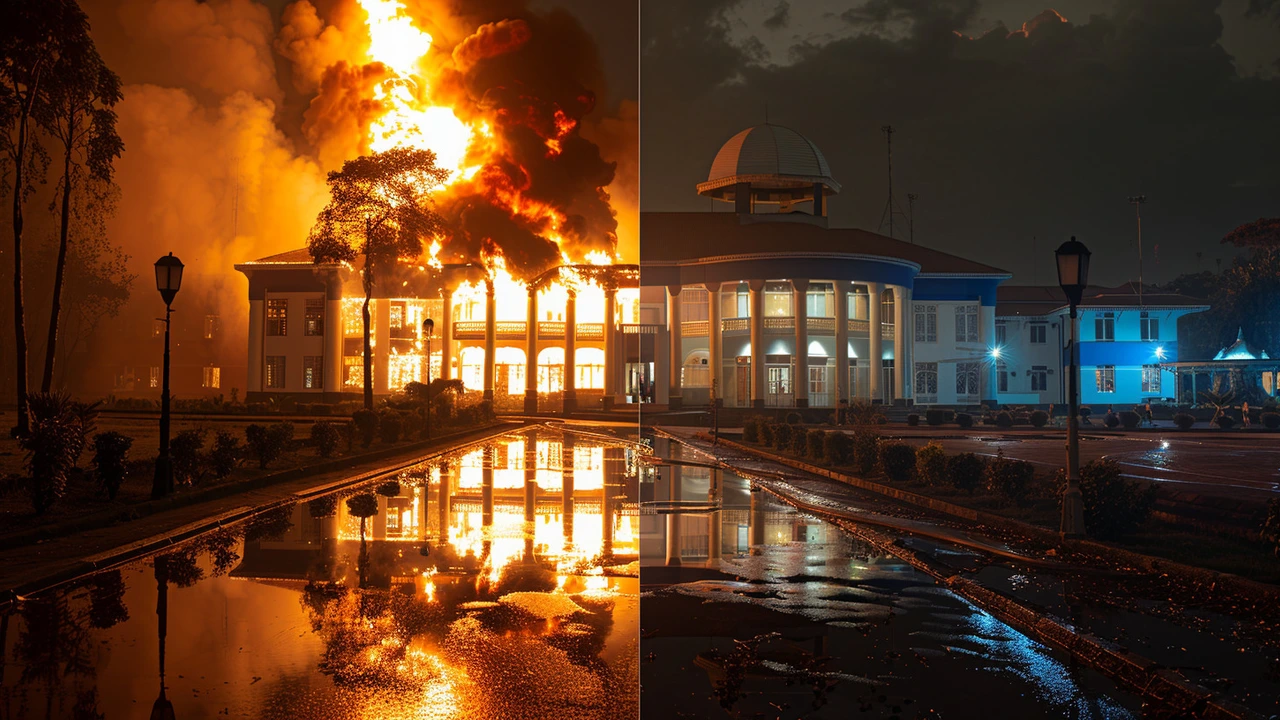Tragic Blaze Destroys Historic Moi Library at Kenyatta University

On a quiet Friday night, what should have been a peaceful start to the weekend at Kenyatta University turned into a night of horror and loss. The Old Moi Library, a cornerstone of educational pursuit and heritage at the university, was engulfed by a raging fire on May 5, 2024. The flames not only consumed decades of accumulated knowledge but also left the university community in a state of shock and mourning.
Established several decades ago, the Old Moi Library had been a beacon of learning and a repository of not just books but numerous scholarly articles, historical documents, and rare manuscripts. This made the fire not just a physical loss but a deep intellectual setback to the academic community and beyond. The destruction inflicted by the fire is not just of material value; it represents a severe disruption in academic and research activities within the university.
The Night of the Blaze
As per eyewitness accounts and university reports, the fire erupted under mysterious circumstances. It began late in the evening, and by the time the flames were noticed, they had already taken significant control of the structure. University security and local fire departments responded quickly, but the ferocity and speed of the flames challenged containment efforts. Firefighters worked through the night, battling the blaze to prevent it from spreading to adjacent buildings in the densely populated educational complex.
The effort of these brave souls was predominantly defensive, aimed at containing the blaze and protecting nearby structures, which included lecture halls and residential buildings. This swift action prevented further destruction but could not save the library itself. By the dawn, the once stately library was reduced to a skeletal structure, its contents turned to ash. The glow from the fire, visible from miles away, marked a somber moment for Kenyatta University's history.
Immediate Impact and University Response
Following the fire, the university administration was quick to act. An emergency meeting was called to assess the impact and to formulate an immediate response. The loss of the Old Moi Library prompted the university to suspend all routine activities for three days. This was a period of mourning but also a necessary pause for safety checks and psychological support for students and staff alike.
The incident drew attention to the need for enhanced safety protocols and infrastructure resilience against such disasters. Discussions and plans were immediately set into motion to not only rebuild the lost structure but to incorporate modern fire safety technologies and quicker emergency response strategies.
Broader Implications and Reactions
The destruction of the Old Moi Library raises serious concerns about safety measures and emergency preparedness in educational institutions. It beckons a nationwide review of how cultural and educational heritages are protected against unforeseen disasters. Calls for rigorous safety audits and enhanced training for handling such emergencies were echoed by educators across the region.
Beyond the direct impact, the incident has spurred a broader dialogue on academic resilience and the need for digital backups of irreplaceable academic materials. Institutions are now looking into more robust methods of preserving their academic materials, including digital archives that can withstand physical damage to original documents.
Restoration and Looking Forward
Kenyatta University has vowed to restore the library, with plans underway to not only rebuild but also modernize the facility. Fundraising efforts and appeals for international support have been initiated, focusing on creating a new library that stands as a symbol of resilience and modernity.
As the university community begins to heal from this tragic event, the focus remains steadfast on recovery and rebuilding. The spirit of resilience is palpable as students, faculty, and administration collectively navigate through the aftermath and toward a hopeful future, ensuring such a disaster never occurs again.






Phillip Cullinane
May 4, 2024 AT 23:42Witnessing the conflagration that consumed the Old Moi Library evokes a profound sense of collective loss that transcends mere brick-and-mortar devastation. The institution was not only a repository of physical volumes but also an epistemic hub where interdisciplinary scholarship thrived, fostering a symbiotic relationship between pedagogy and research. Its annihilation disrupts the ontological continuity of knowledge transmission, fracturing the intergenerational chain of intellectual inheritance. From a preservationist standpoint, the fire obliterated unique primary sources, incunabula, and region-specific manuscripts that are irreplaceable in the global academic corpus. The resultant lacuna in primary data hampers longitudinal studies, especially those reliant on longitudinal metadata aggregation across decades. Moreover, the loss compounds the challenges already faced by Kenyan academia in securing funding for comprehensive digitization initiatives. The urgency for implementing robust disaster mitigation protocols, such as fire-suppression systems calibrated for archival environments, cannot be overstated. Concurrently, the tragedy underscores the necessity of redundant digital backups, leveraging cloud-based repositories that can withstand localized physical catastrophes. In the absence of such safeguards, the scholarly community is left vulnerable to analogous future eventualities. The emotional toll on faculty, students, and alumni is palpable, as the library served as a symbolic anchor of institutional identity and collective memory. In counseling sessions reported by the university, there are manifestations of collective grief akin to bereavement, indicating the depth of affective attachment to the space. Strategically, the reconstruction effort presents an opportunity to integrate cutting‑edge information architecture, incorporating modular design that facilitates both physical resilience and future scalability. Engaging with international heritage preservation bodies could provide both technical expertise and financial assistance, ensuring that the rebuilt facility adheres to best practices in archival science. Ultimately, this calamitous event should galvanize a paradigm shift toward proactive intellectual stewardship, whereby the safeguarding of knowledge becomes a paramount institutional priority rather than a reactive afterthought.
Janie Siernos
May 5, 2024 AT 00:42It is disheartening to witness such a preventable disaster unfold within an institution that ought to embody the highest standards of responsibility and foresight. The failure to implement basic fire safety measures reflects a broader complacency that undermines the moral obligation to protect cultural heritage. While the university expresses sorrow, the underlying negligence cannot be ignored. A commitment to ethical stewardship demands rigorous audits and accountability, ensuring that future generations are not deprived of invaluable scholarly resources.
joy mukherjee
May 5, 2024 AT 01:42My heart goes out to everyone affected by the fire 😔. The loss of those irreplaceable books and manuscripts is a blow to the whole academic community, and I can only imagine the emotional weight it carries for students and staff alike. It’s crucial that we rally together, offering support and resources as the university rebuilds. Let’s also push for better preservation strategies so something like this doesn’t happen again.
Rob Chapman
May 5, 2024 AT 02:42Thinking about the library’s role reminds us that knowledge is more than stored text it is a living dialogue across time and space. When that dialogue is broken the silence feels heavier than any flame
Delaney Lynch
May 5, 2024 AT 03:42What a devastating event, and yet, amidst the ashes, we find an incredible opportunity, a chance to reimagine, to innovate, to build a library that not only preserves the past but also embraces the future, with state‑of‑the‑art fire suppression, digital archives, and community spaces that inspire collaboration, learning, and resilience!
Nicholas Mangraviti
May 5, 2024 AT 04:42We must prioritize digital backups now.
Jared Greenwood
May 5, 2024 AT 05:42It is incomprehensible how a premier institution in Kenya could allow such a catastrophic failure of basic safety protocols, reflecting a systemic negligence that jeopardizes national intellectual capital. This incident should serve as a wake‑up call for the government to enforce stricter compliance standards across all educational facilities, ensuring that our heritage is protected from preventable disasters.
Sally Sparrow
May 5, 2024 AT 06:42The rhetoric here borders on alarmist sensationalism, overlooking the nuanced challenges that universities face in balancing resource constraints with infrastructural upgrades. Blaming policy alone simplifies a complex issue that also involves legacy building designs and limited funding streams.
Eric Yee
May 5, 2024 AT 07:42Man the fire was wild but the vibes of the community pulling together were lit, showing that even when the walls go up in smoke the spirit stays solid.
Sohila Sandher
May 5, 2024 AT 08:42i cant bielieve how sad this is, the library was a proper spot for study and chill, hope they fix it up real soon.
Anthony Morgano
May 5, 2024 AT 09:42Totally feeling the loss too 😊 let's keep pushing for better digital safeguards and maybe set up a crowd‑funded project for the new library to make sure it’s fire‑proof and future‑ready!